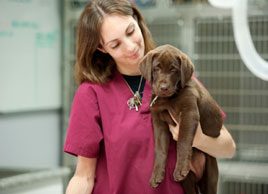6 vaccines your dog may need
Here’s what you need to know to keep your canine companion both happy and healthy

Source: Best Health Magazine, March/April 2010
When the weather is nice, your pooch is probably eager to run through puddles and play with other dogs’and that means you need to think about vaccines and how to best protect your pet. But there has been a shift away from an annual, one-size-fits-all vaccination schedule toward more individualized plans, says Dr. Nigel Gumley, an Ottawa-based veterinarian. To figure out what your dog needs, ‘let your vet look at his breed, size and lifestyle. Ask how prevalent a particular disease is in your community, and what risks and benefits the vaccines offer.’ Here are some guidelines.
Rabies
No treatment for this deadly disease’in most jurisdictions, you’re required by law to vaccinate your dog against rabies.
Cause: A bite from an infected animal, typically raccoons, skunks, foxes and bats. Can be passed on to humans.
When to vaccinate: As early as three months of age. Then, a booster annually or every three years, depending on the local laws.
Parvovirus
Causes vomiting, severe diarrhea and loss of appetite, but is treatable.
Cause: Contact with an infected dog’s feces, even after it’s been scooped.
When to vaccinate: All puppies under four months (at least three doses and a one-year booster). Revaccination recommended every three years.
Distemper
Often fatal. Attacks the central nervous system, causing seizures, respiratory problems, vomiting and diarrhea.
Cause: Spreads from dog to dog via saliva and urine. Highly contagious.
When to vaccinate: All puppies under four months (at least three doses and a one-year booster). Revaccination recommended every three years.
Hepatitis
Affects the liver, kidneys, eyes and lungs, and can cause sudden death. A dog can still be contagious even after recovery.
Cause: Contact with body fluids and feces from other dogs.
When to vaccinate: All puppies under four months (at least three doses and a one-year booster). Revaccination recommended every three years.
Leptospirosis
Symptoms include fever, vomiting, lethargy, dehydration, diarrhea and loss of appetite; can cause liver and kidney failure.
Cause: Drinking from standing water that has been travelled through by infected raccoons and skunks. More common after wet or damp seasons.
When to vaccinate: Annual vaccine if this is a problem where you live (ask your vet). Not recommended for puppies under 12 weeks.
Bordetella/parainfluenza
‘Kennel cough’ symptoms include hacking, nasal discharge, fever and lethargy. Highly contagious and can be fatal.
Cause: Passes quickly from dog to dog in training classes or any dog-group settings.
When to vaccinate: High-risk dogs: booster shots once or twice a year. (House dogs may not need it.)
This article was originally titled "Doggy checkup" in the March/April 2010 issue of Best Health. Subscribe today to get the full Best Health experience’and never miss an issue!’and make sure to check out what’s new in the latest issue of Best Health.




